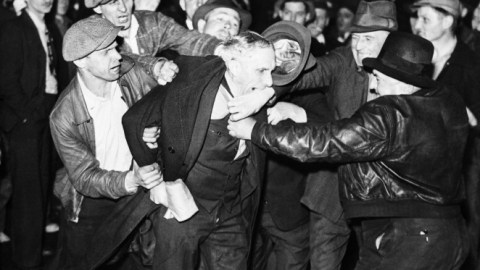Why Re-unionization Won’t Happen

Matt Yglesias and Timothy Noah are having an interesting dialogue about Noah’s new book about income inequality, The Great Divergence. (As are Brink Lindsey and Mark Schmitt at Washington Monthly.) Noah thinks the breakdown of labor unions is to a significant degree responsible for increasing inequality. What’s more, “I don’t think it’s possible to make much headway reversing the inequality trend without it,” he says. Without re-unionization, that is. Matt seems pessimistic about the prospects of a great American union revival, and Noah really seems pretty pessimistic, too, though he’s holding out hope for a few of Andy Stern’s ideas and a longshot strategy to “extend legal protections under the Civil Rights Act to union membership.” I’m pessimistic, too. In fact, thinking about Jonathan Haidt’s moral foundations theory, a super-pessimistic hypothesis about the prospects for re-unionization just occurred to me.
So the point of a labor union is to prevail in conflict with capitalists over the distribution of the surplus from economic cooperation through the power of collective action. Solidarity is the prime union value because the strength of a union rests in the willingness of individuals to join together, potentially at great personal cost, in order to create a unified force capable of meeting head on the power of concentrated capital. What just occurred to me is that this is precisely the sort of thing Haidt’s conservative “binding foundations” — loyalty, authority, and sanctity — are good for.
In the heyday of unionization, the Democratic Party was full of conservatives. Indeed, the most temperamentally conservative people in America, pro-Jim Crow Southern whites, were a huge and indispensable part of the Democratic coalition. This required that the Democratic Party remain effectively conservative on social issues. As a consequence, not only could conservative Southerners feel comfortable in the party, but so could conservatives in the Northern, urban, industrial hotbeds of unionization. And these are the people–such is my conjecture–who were the muscular beating heart of the labor movement at its height. Solidarity comes naturally to those whose moralities are built on the conservative binding foundations. In-group do or die! Rally around our great leaders! The brotherhood is holy! Scabs are literally disgusting lowlife!
As Haidt notes in The Righteous Mind, left-right polarization was pretty much inevitable once LBJ backed the Civil Rights Act, leading to the great migration of conservative Southern whites to the GOP. This actually took a good long while to work itself out, but at this point folks have pretty well sorted themselves into parties according to moral temperament. The main exceptions are that the Democratic Party still contains a fair number of relatively psychologically conservative African-Americans and Hispanics, as well as a good handful of lower-income conservative whites. And the GOP contains a handful of relatively psychologically liberal libertarian and free-market types.
The upshot is that an overwhelming majority of Americans with conservative moral psychologies, the Americans best at loyalty, are loyal to the GOP. And the GOP is officially hostile to the labor movement. Which is to say, America’s native supply of solidaristic sentiment is now overwhelmingly arrayed against all the pro-union reforms Tim Noah would like to see put in place. Which does not bode well for the prospects of getting it re-arrayed against capital. And I don’t think it’s going to get any better.
Minorities and low-income Americans offset to some extent the socially progressive pressure of liberal young folk and well-schooled white-collar professionals, but it remains that the Democratic Party is becoming increasingly inhospitable to temperamental conservatives. So those of us with especially strong solidaristic instincts increasingly dislike the Democratic Party, while those of us inclined to like the Democratic Party have relatively weak solidaristic instincts. Finding the idea of solidarity absolutely splendid probably won’t cut it.
The bottom line seems to me that any realistic prospect of American re-unionization would require the labor movement to abandon its alliance with social liberals and bid America’s nativist xenophobe sexists back to the fold. I don’t think anybody’s interested in this. So I suspect the future of organized labor will look a lot like the present: sanitation workers and social studies teachers not-quite-viciously fighting America’s nativist xenophobe sexists for the right to continue to collect rents from taxpayers.





